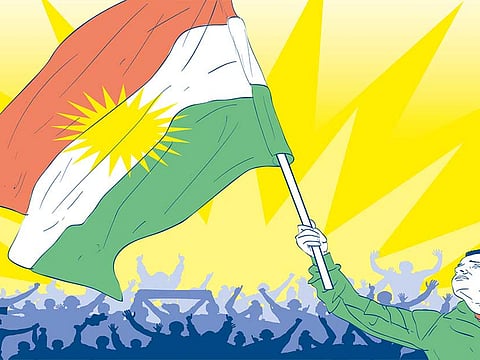Why Kurdish independence move is dangerous
The US is opposed to it and so are regional heavyweights like Saudi Arabia and Egypt

Back in May 1945, a rumour had spread throughout the Old City of Damascus, saying that the president of the republic had been killed by French colonisers and that the entire Cabinet had fled to Jordan. On the slopes of Mount Qassioun, Damascene Kurds poured into the streets, seeing opportunity in the French-brought disaster. They distributed arms to young men and erected barracks around their neighbourhood, known as Hay Al Akrad, taking down the Syrian flag and replacing it with the Kurdish one. A mini-state was automatically created in Damascus, which lasted for about two hours only, prompting the then prime minister, Jamil Mardam Bey, to emerge from his hideout and drive straight into the Kurdish enclave, despite the threats of being killed by the French, assuring Kurdish leaders that the government was still in power and that it was only a matter of time before law and order were restored to the city.
Although muzzled for 400 years under the Ottomans, the story of an independent Kurdistan has been a hot topic for at least 100 years. It was first touted by the Great Powers during the First World War, through the backroom Sykes-Picot Agreement of 1916.
In the infamous Franco-British treaty of the post-war Middle East, the Kurds were promised certain rights, but denied a unified state. When the French mandate was implemented in 1920, the Kurds were denied even limited autonomy, similar to that given to the Alawites and the Druze in Syria. Local society treated them with white gloves throughout the mandate years and in the early independence era, as a proud people whose hopes were dashed, making two of them premiers in 1941-1949 and crowning a third, Ebrahim Hanano, as leader of the anti-colonial movement.
Just like they did in 1945, the Kurds never missed a chance to voice their desire for autonomy or statehood. Although many were treated as A-class citizens, the community as a whole felt uncomfortable with their positioning in Syrian society, seeing themselves as unique, different and somewhat superior to the Arabs. During the climactic years of Arab nationalism, it became politically incorrect to voice non-Arab ethnic loyalties throughout the Middle East. Kurds were then treated only as Syrian citizens, never as Syrian Kurds. In the forced assimilation process, they were denied the right to use their language and were deprived of schooling, music, political parties and publications. In 1962, they paid a horrendous price, when the Damascus government stripped 120,000 Kurds, mainly in the Al Jazira province of eastern Syria, of their Syrian nationality. They were registered as foreigners, having originally arrived from Turkey or Iraq, and denied access to jobs, civil rights and political offices. This coincided with a Kurdish uprising in Iraq, led by Mustafa Barzani and the discovery of oil in Kurdish territories, to which they were denied access by the Baghdad government. Iraqi Kurds demanded statehood while their Syrian brethren wanted citizenship and equal rights. The first were accommodated by the United States back in 1991, after the creation of Iraqi Kurdistan in the aftermath of the Gulf War. Twenty years later, the issue of stateless Syrian Kurds was finally resolved, as Damascus finally recognised their plight after years of persecution, allowing them to celebrate their holidays, use their language, and carry Syrian IDs. Both, however, are now asking for more. Iraqi Kurds are eyeing complete independence of their de facto state, while Syrian Kurds are pushing for a referendum, to be held tomorrow, hoping to create a Kurdish-backed Federal Government of Syria.
Bold prospect
The second ambition is somewhat valid, especially in light of the great degree of autonomy that the Kurds have carved out for themselves, west of the Euphrates River. Syrian Kurds realise that because they are dispersed and their territories are not connected, they are incapable of creating a separate Syrian Kurdistan at present. Instead, they have agreed to the less ambitious but equally bold prospect of a federal government, which would secure most of what they need in the future in Syria — politically as well as economically. They also feel they are indispensable for the US, owing to their consecutive battles against Daesh (the self-proclaimed Islamic State of Iraq and the Levant) in Iraq and Syria.
Within Iraq, however, the situation is different. The Kurdish Government went ahead with the referendum date without consulting any of its allies, ignoring the fact that if the vote leads to independence, it could be fatal for the US-backed all-Kurdish Syrian Democratic Forces. To date, they are the most effective fighters against Daesh and the only military group still receiving funds, arms and training from the US.
Future battle trophies — the remainder of Al Raqqa or the city of Al Bukamal on the Euphrates — might get obstructed badly by the referendum, turning entire Arab populations against the Kurds. Daesh will certainly exploit the Turkish-Kurdish war, and so would other terrorist groups that might infiltrate the tiny new independent country, making it a magnet for terrorists and an incubator for non-state actors.
Sami Moubayed is a Syrian historian and former Carnegie scholar. He is also the author of Under the Black Flag: At the frontier of the New Jihad.



